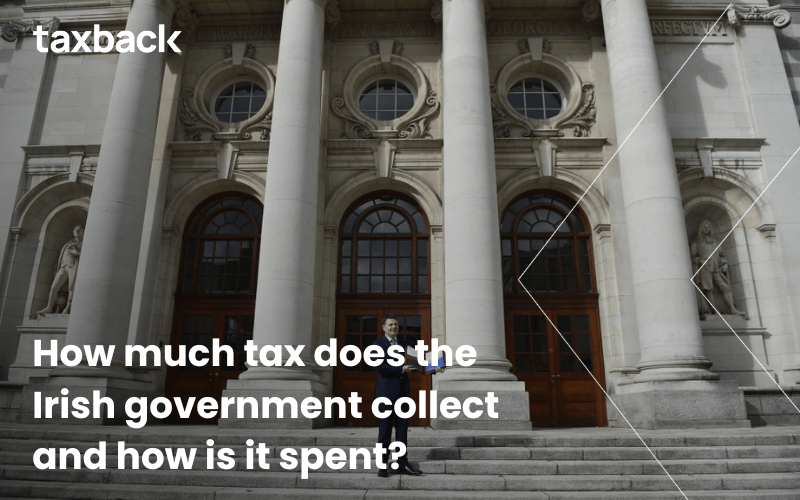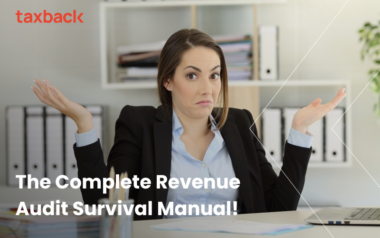The vast majority of employees working in Ireland pay tax on their earnings.
(No surprises there!)
But what does the government actually do with the tax contributions received from the workforce?
In this guide, we take a closer look at exactly how much tax you pay and where that money is spent.
How does the Irish government raise revenue?
The Irish government raises revenue primarily through its programme of taxation.
Income can also be generated through other avenues such as borrowing and the privatisation of state assets.
The Irish government collects both direct taxes and indirect taxes. Direct taxes are taxes on income such as Income Tax (IT), Pay Related Social Insurance (PRSI), Universal Social Charge (USC), and Corporation Tax.

Indirect taxes are taxes on expenditures including Value Added Tax (VAT), Excise Duties, taxes on property and taxes on capital such as inheritance or gift tax.
The government use the PAYE (Pay As You Earn) system to charge income tax, PRSI, and USC on employment income. Employers deduct these three taxes on behalf of Revenue (the organisation which manages tax in-take on behalf of the government).
While PAYE workers automatically deducted from their wages, if you are self-employed or earn income from investments or a rental property, you must complete a self-assessed tax return and pay any taxes you owe by the 31 October deadline.
How much tax do I pay?
Income Tax
Ireland has a progressive income tax system. That means that higher income earns pay tax at a higher rate. The rates of income tax that the government collects are 20% and 40%.
Income up to €42,000 (single individuals in 2024) is taxed at a standard rate of 20% and any income above this standard rate band is taxed at a higher rate of 40%.
You may be entitled to earn more income at the standard rate of tax, depending on your personal circumstances. For example, if you are:
- Married or in a civil partnership
- A widowed person or surviving civil partner
Tax credits reduce the tax you pay on your taxable income. The number of tax credits you are entitled to depends on your personal circumstances.
Further information on the different types of tax credits can be found here.
PRSI
PRSI contributions must be paid by employees and employers. You must contribute to PRSI payments if you are over the age of 16. These contributions need to be paid whether you work full-time or part-time if you earn over €38 per week.
Self-employed workers earning over €5,000 per year must also contribute to PRSI. PRSI payments do not go into the government’s central tax fund, instead, they are paid into the Social Insurance Fund.
USC
USC must be paid if your income is over €13,000 in a year. If your income is €13,000 or less, you pay no USC. Once your income is over €13,000 you pay the relevant USC rate.
For example, if you have an income of €13,000 you pay 0.5% on income up to €12,012 and 2% on the balance.

Standard Rate of USC 2024
| 2025 | Standard rate of USC |
|---|---|
| First €12,012 | 0.5% |
| Next €15,370 | 2% |
| Next €42,662 | 3% |
| Balance (above those amounts) | 8% |
| Self-employed income over €100,000 | 11% |
- 0.5% on the first €12,012 and 2% on the balance.
Reduced rates of USC apply to:
- People aged 70 or over with a total income for the year of €60,000 or less
- Medical card holders aged under 70 whose total income for the year is €60,000 or less
Visit our No-Nonsense Guide to PAYE Taxes in Ireland for more information on the PAYE tax system.
Note: you may be due a tax refund due to an overpayment of tax, use our free online tax calculator to get an estimate of your tax refund.
Additional types of taxes in Ireland that government income is generated from
VAT is a tax that is added to goods and services and it is charged at a standard rate of 23% and a reduced rate of 13.5%.
Corporation Tax refers to the tax paid by limited companies. In Ireland, the rate of Corporation Tax rate has increased from 12.5% to 15% effective 1 January 2024.
Unless a business’s revenue is less than €750 million, in which case, Corporation Tax will remain at 12.5%.
Excise duties are taxes applied to certain goods such as alcohol, tobacco and fuel.
How much tax does the government collect?
In 2023 the government collected €88.1 billion in tax revenue, an annual increase of €5.0 billion from 2022.
Income tax receipts amounted to €32.9 billion in 2023, up 7.1% from 2022. This is attributed to salary increases for workers and a high employment rate.
Corporation tax receipts amounted to €23.8 billion last year. This figure increased by almost 1.2% from the previous year.
VAT receipts amounted to €20.3 billion last year, €1.7 billion more than the previous year.
In 2023, the gross voted expenditure was €94.7 billion. Gross voted expenditure refers to expenditure on the ordinary services of the government – social protection, health, education etc.
This type of spending must be approved by Dáil vote before it can be legally valid. This was €5.9 billion higher than expenditure in 2022 as additional spending was allocated to public services, infrastructure, and social assistance.
Additionally, an Exchequer surplus of €1.2 billion was recorded last year, €3.8 billion less than last year. This decrease is primarily attributed to increased public expenditures.
Check out key tax dates in Ireland here:
How does the Irish government spend tax money?
Government expenditure is broken down into current expenditure and capital expenditure.
Current expenditure is the ongoing, day-to-day expenses of the country. Examples of government current expenditure include the costs of running schools, hospitals, and other essential services in Ireland.
It also includes wages to public servants, welfare payments, housing support payments and servicing the national debt.
Capital expenditure refers to money spent by the government on long-term projects. Government capital expenditure includes projects such as building roads, schools, hospitals or improving broadband infrastructure.

How much does the Irish government spend?
The annual budget generally takes place in October. It outlines the government spending allocations for the upcoming year.
Typically, the largest amount of government expenditure in Ireland each year goes towards social protection. This includes disability and carer’s supports, social welfare payments, pensions and more.
The total estimated expenditure for 2023 is *€99.8 billion. The breakdown is as follows:
- Social Protection – €23.4 billion
- Health – €23.4 billion
- Education €9.6 billion
- Justice – €3.3 billion
- Debt Servicing, EU Payments – €13.6 billion
- Transport €3.5 billion
- Other – €22.9 billion
*Note: figures refer to estimated expenditure rather than actual expenditure.
What happens if I pay too much tax to Revenue? Can I claim my tax back?
The good news is if you have paid too much tax to Revenue, you can get a tax refund. In order to claim tax back you must complete an income tax return.
You must claim your tax back from Revenue within four years, therefore from January 2024 you can submit an income tax return for the years 2020-2023.
Do you need help claiming your tax refund? We can help you to claim every tax entitlement you’re due.
The average Irish tax refund is €1,880
How much do tax cuts cost the Exchequer?
In Budget 2023, the government announced an increase in the standard rate cut-off point from €36,800 to €40,000 for single persons. The government also increased the personal, employee and income tax credits by €75 along with an increase of €100 in the home carer tax credit.
These changes were estimated to cost the exchequer €1.2 billion a year.
The government also introduced an increase of the USC 2% rate band ceiling by €1,625 in line with the increase in the minimum wage. These cost a total of €77 million in a full year.
The rent tax credit applicable to approximately 400,000 renters will come at a cost of €200 million.
What is USC used for?
The USC was introduced into the Irish tax system in 2011 during the financial crisis. USC replaced the Income Levy and the Health Levy.
The primary purpose of collecting USC was to widen the tax base and to provide a steady income to the Exchequer to fund public services. USC continues to do so as generates revenue of €4 billion annually for the State.
What is PRSI used for?
PRSI contributions are paid to the Social Insurance Fund. PRSI is the main source of funding for social welfare payments, and it is used to fund benefits such as Jobseeker’s Benefit, Illness Benefit, and State Pensions. PRSI payments may entitle you to claim a range of benefits from the Department of Social Protection.
People that meet the required number of PRSI contributions can also avail of the Treatment Benefit Scheme. Under this scheme, you may qualify for benefits such as: dental care, optical care, hearing aids and repairs, hair replacement products.
Who can help me claim my tax back?
It is important to remember that you could be due a tax refund at the end of each tax year. The average Irish tax refund is €1,880! Fortunately, you can claim tax back for the last four years.
Why leave your money with the taxman? At Taxback we can take the stress out of tax returns and we will ensure you get the maximum tax refund!
Taxback handles all of the paperwork and your tax refund will be transferred straight to your bank account.
Last Updated on February 14, 2024








